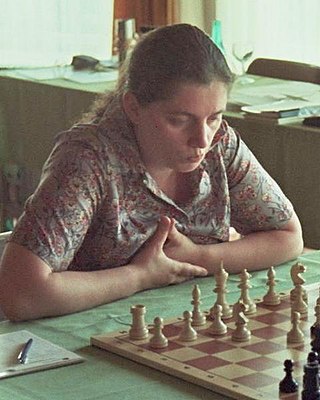1976 Interzonals
For the first time, the women's cycle contained not one but two Interzonal tournaments, held in Roosendaal, Netherlands and Tbilisi, Georgian SSR in November and December 1976, featuring the best players from each FIDE zone. A total of 25 players took part, with the top three from each Interzonal qualifying for the Candidates Tournament.
Akhmilovskaya and former three-time challenger Kushnir (now representing Israel) shared first place in Roosendaal, while Lematschko took the third and last spot in the Candidates after a playoff against van der Mije. [1]
In Tbilisi, Fatalibekova won, half a point ahead of Kozlovskaya and 15-year-old prodigy Chiburdanidze. [2]
1976 Women's Interzonal, Roosendaal Player 1 2 3 4 5 6 7 8 9 10 11 12 13 14 Points Tie break 1  Elena Akhmilovskaya (Soviet Union)
Elena Akhmilovskaya (Soviet Union)- ½ 0 1 ½ 1 ½ ½ 1 1 ½ 1 1 1 9½ 54.25 2  Alla Kushnir (Israel)
Alla Kushnir (Israel)½ - ½ 0 1 ½ ½ 1 1 1 1 ½ 1 1 9½ 54.00 3  Alexandra van der Mije (Netherlands)
Alexandra van der Mije (Netherlands)1 ½ - 1 ½ ½ 1 ½ ½ 0 ½ 1 1 1 9 54.75 4  Tatjana Lematschko (Bulgaria)
Tatjana Lematschko (Bulgaria)0 1 0 - 0 1 ½ 1 1 1 ½ 1 1 1 9 49.00 5  Zsuzsa Veroci (Hungary)
Zsuzsa Veroci (Hungary)½ 0 ½ 1 - ½ 1 0 ½ 1 ½ 1 1 1 8½ 6  Jana Malypetrová (England)
Jana Malypetrová (England)0 ½ ½ 0 ½ - ½ 1 ½ ½ 1 ½ 1 1 7½ 7  Liudmila Belavenets (Soviet Union)
Liudmila Belavenets (Soviet Union)½ ½ 0 ½ 0 ½ - ½ ½ 1 1 ½ ½ 1 7 8  Tatyana Fomina (Soviet Union)
Tatyana Fomina (Soviet Union)½ 0 ½ 0 1 0 ½ - 0 1 ½ ½ 1 1 6½ 34.75 9  Milunka Lazarević (Yugoslavia)
Milunka Lazarević (Yugoslavia)0 0 ½ 0 ½ ½ ½ 1 - 0 ½ 1 1 1 6½ 32.50 10  Corry Vreeken (Netherlands)
Corry Vreeken (Netherlands)0 0 1 0 0 ½ 0 0 1 - 1 ½ 1 ½ 5½ 11  Ruth Orton (USA)
Ruth Orton (USA)½ 0 ½ ½ ½ 0 0 ½ ½ 0 - 1 0 1 5 12  Maria Cristina de Oliveira (Brazil)
Maria Cristina de Oliveira (Brazil)0 ½ 0 0 0 ½ ½ ½ 0 ½ 0 - 1 ½ 4 13  Ilse de Caro (Colombia)
Ilse de Caro (Colombia)0 0 0 0 0 0 ½ 0 0 0 1 0 - 1 2½ 14  Rita Gramignani (Italy)
Rita Gramignani (Italy)0 0 0 0 0 0 0 0 0 ½ 0 ½ 0 - 1
1976 Women's Interzonal, Tbilisi Player 1 2 3 4 5 6 7 8 9 10 11 Points Tie break 1  Elena Fatalibekova (Soviet Union)
Elena Fatalibekova (Soviet Union)- ½ 1 ½ ½ ½ ½ 1 ½ 1 1 7 2  Maia Chiburdanidze (Soviet Union)
Maia Chiburdanidze (Soviet Union)½ - 1 0 ½ 1 1 ½ 1 ½ ½ 6½ 31.25 3  Valentina Kozlovskaya (Soviet Union)
Valentina Kozlovskaya (Soviet Union)0 0 - 1 1 ½ ½ 1 1 ½ 1 6½ 28.75 4  Marta Litinskaya (Soviet Union)
Marta Litinskaya (Soviet Union)½ 1 0 - 1 ½ ½ ½ 0 1 1 6 28.00 5  Mária Ivánka (Hungary)
Mária Ivánka (Hungary)½ ½ 0 0 - ½ 1 ½ 1 1 1 6 25.00 6  Tatiana Zatulovskaya (Soviet Union)
Tatiana Zatulovskaya (Soviet Union)½ 0 ½ ½ ½ - 0 ½ 1 ½ 1 5 7  Petra Feustel (East Germany)
Petra Feustel (East Germany)½ 0 ½ ½ 0 1 - ½ ½ 0 1 4½ 21.00 8  Gertrude Baumstark (Romania)
Gertrude Baumstark (Romania)0 ½ 0 ½ ½ ½ ½ - ½ 1 ½ 4½ 20.00 9  Brigitte Hofmann (East Germany)
Brigitte Hofmann (East Germany)½ 0 0 1 0 0 ½ ½ - ½ 1 4 10  Diane Savereide (USA)
Diane Savereide (USA)0 ½ ½ 0 0 ½ 1 0 ½ - 0 3 11  Narelle Kellner (Australia)
Narelle Kellner (Australia)0 ½ 0 0 0 0 0 ½ 0 1 - 2








